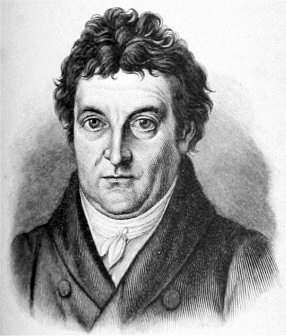Johann Gottlieb Fichte frasi celebri
Nicolao Merker
La missione del dotto, Citazioni sull'opera
La missione del dotto, lezione I, 1794
Origine: La missione del dotto, p. 12
Origine: La missione del dotto, p. 18
Frasi sull'et di Johann Gottlieb Fichte
Origine: La missione del dotto, p. 50
dalle Lezioni sulla missione del dotto, 1794
“Chiamo società la relazione reciproca degli esseri razionali.”
Origine: La missione del dotto, p. 22
“L'intellettuale è tale solo se considerato all'interno della società.”
Origine: La missione del dotto, p. 37
Nicolao Merker
La missione del dotto, Citazioni sull'opera
Johann Gottlieb Fichte Frasi e Citazioni
da Fondamento dell'intera dottrina della scienza, 1794 – GA, I/2 p. 394
“L'essenza interna ed assoluta di Dio viene alla luce come bellezza.”
Introduzione alla vita beata
Introduzione alla vita beata
Origine: La missione del dotto, p. 7
Origine: La missione del dotto, p. 12
Origine: La missione del dotto, p. 13
Origine: La missione del dotto, p. 13
Origine: La missione del dotto, p. 16
Origine: La missione del dotto, p. 17
Origine: La missione del dotto, p. 17
Origine: La missione del dotto, p. 26
“Noi siamo ancora al basso grado della semi-umanità, ovvero alla schiavitù.”
Origine: La missione del dotto, p. 32
Origine: La missione del dotto, p. 33-34
Origine: La missione del dotto, p. 39
“Nell'uomo esiste uno stimolo al sapere, e in particolare a ciò che gli torna utile.”
Origine: La missione del dotto, p. 58
Origine: La missione del dotto, p. 62
da una lettera alla moglie del 26 maggio 1794; citato nell'introduzione, p. IX
La missione del dotto, Citazioni sull'opera
da Discorsi alla nazione tedesca, IX discorso; citato in William Boyd, Storia dell'educazione occidentale, traduzione di Trieste Valdi, Armando Armando Editore, 1966
dalle Lezioni sulla missione del dotto, 1794
da Lo Stato di tutto il popolo, a cura di Nicolao Merker, Roma 1978
dalla Prima introduzione alla dottrina della scienza, 1797
“L'Io puro oppone nell'Io ad un io divisibile un non-io divisibile.”
dalla Dottrina della scienza, 1794
“L'umanità respinge il cieco caso e il potere del destino. Essa ha in mano il proprio destino.”
citato in Roger Garaudy, Karl Marx
“L'uomo può ciò che egli deve; e se dice: "Io non posso", segno è che non vuole.”
da Contributo per rettificare i giudizi del pubblico sulla Rivoluzione francese, 1793
III; 1943, p. 141
La missione del dotto
Johann Gottlieb Fichte: Frasi in inglese
Origine: The Characteristics of the Present Age (1806), p. 83
Origine: The Characteristics of the Present Age (1806), p. 64
With regard to this fundamental principle, as we have now declared and adopted it without farther definition or limitation, this third Age is precisely similar to that which is to follow it, the fourth, or age of Reason as Science,—and by virtue of this similarity prepares the way for it. Before the tribunal of Science, too, nothing is accepted but the Conceivable. Only in the application of the principle there is this difference between the two Ages,—that the third, which we shall shortly name that of Empty Freedom, makes its fixed and previously acquired conceptions the measure of existence; while the fourth—that of Science—on the contrary, makes existence the measure, not of its acquired, but of its desiderated beliefs.
Origine: The Characteristics of the Present Age (1806), p. 19
Preface
The Characteristics of the Present Age (1806)
Jane Sinnett, trans 1846 p.125
The Vocation of Man (1800), Faith
Jane Sinnett, trans 1846 p.123
The Vocation of Man (1800), Faith
Jane Sinnett, trans 1846 p.120
The Vocation of Man (1800), Faith
Jane Sinnett, trans 1846 p.115
The Vocation of Man (1800), Faith
Jane Sinnett, trans 1846 p.110
The Vocation of Man (1800), Faith
Jane Sinnett, trans 1846 p.104
The Vocation of Man (1800), Faith
Jane Sinnett, trans 1846 p.94
The Vocation of Man (1800), Faith
Jane Sinnett, trans 1846 p. 88
The Vocation of Man (1800), Faith
Jane Sinnett, trans 1846 p. 77
The Vocation of Man (1800), Faith
Jane Sinnett, trans 1846 p. 60
The Vocation of Man (1800), Knowledge
Jane Sinnett, trans 1846 p. 53
The Vocation of Man (1800), Knowledge
Jane Sinnett, trans 1846 p. 50
The Vocation of Man (1800), Knowledge
Jane Sinnett, trans 1846 p. 47
The Vocation of Man (1800), Knowledge
Jane Sinnett, trans 1846 p. 44
The Vocation of Man (1800), Knowledge
Jane Sinnett, trans 1846 p. 24
The Vocation of Man (1800), Doubt
Jane Sinnett, trans 1846 p. 21
The Vocation of Man (1800), Doubt
Jane Sinnett, trans 1846 p. 13
The Vocation of Man (1800), Doubt
Origine: The Vocation of Man (1800), Doubt, P. Preuss, trans. (1987), p. 4
Origine: The Science of Rights 1796, P. 502, 503, 504
Origine: The Science of Rights 1796, P. 474, 477
Origine: The Science of Rights 1796, P. 459
Origine: The Science of Rights 1796, p. 406
Origine: The Science of Rights 1796, P. 324
Origine: The Science of Rights 1796, P. 247
Origine: The Science of Rights 1796, P. 220
